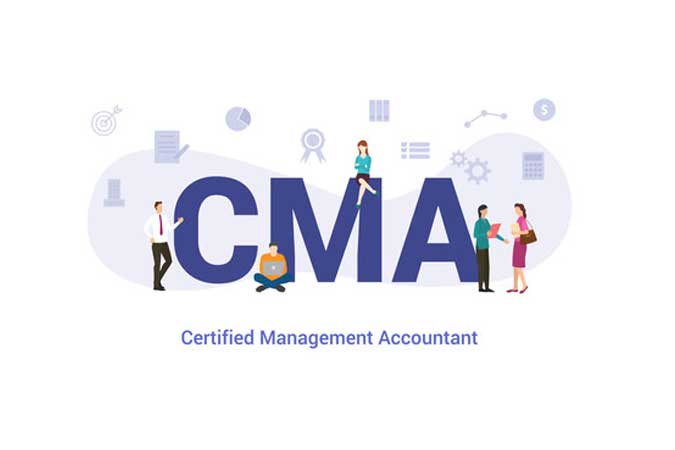The Institute of Cost Accountants (ICAI) offers a cost accounting course. Some individuals refer to the course as CMA, which stands for Cost and Management Accounting. Cost and Works Accounting was the full form of CWA. The course administering body in India was the same at the time. If you are a good student who is interested in managing the accounts of multiple departments within a firm and integrating them to help reduce expenses, the ICWA course is for you. With or without formal training, the CMA course lasts three years.
What is CMA Courses?
CMA, or Cost and Management Accounting, is a certificate course that qualifies students for the CMA certification. The certification opens the door to a rewarding career in company accounting. Management, Regulatory Framework, Strategy, and Financial Reporting are the four pillars of knowledge that the CMA course is built on. After passing the CMA test at one of the three levels listed below, a candidate is given the designation of CMA.
- Foundation (Level 1)
- Intermediate (Level 2)
- Final (Level 3)
Difference Between CWA, CMA, ICMAI, and ICWAI
From the beginning, the institute that offered the course stayed the same. The Institute of Cost and Work Accountants of India (ICAI) was renamed the Institute of Cost and Work Accountants of India (ICAI) (ICWA). Both courses are the same; just the name has changed in prior years.
CMA Course Eligibility Criteria
At each level, the eligibility requirements for taking the CMA exam differ. The CMA course eligibility criteria for all three levels are listed below.
Eligibility Criteria for the CMA Foundation
- Have completed Class 10 or an equivalent course, followed by Class 12 or an equivalent course.
- If they’ve passed the National Diploma in Commerce Exam (AICTE or by any recognised board)
Eligibility Criteria of the CMA Intermediate
- SSC or equivalent Foundation or entry level of the Institute of Cost Accountants of India’s Common Admission Test (CAT) (ICAI)
- Graduation from any programme (except Fine Arts)
- Even students who are awaiting results would be eligible for CMA courses.
Eligibility Criteria of the CMA Final
- Students who have completed their Intermediate level at school and are planning to graduate in any field (except Fine Arts)
- Have completed all eight of the Intermediate course’s papers
CMA Course Fees and Duration
CMA Course Fees
- The cost of the CMA Foundation course is INR 6,000.
- Fees for the CMA Intermediate course are INR 23,100 or INR 12,000 at the time of registration, with the balance due by January 31 and July 31 for the June and December term exams, respectively.
- Final course fee for CMA: INR 25,000 or INR 15,000 at the time of registration, with the balance due by January 31 and July 31 for June and December term exams, respectively.
Syllabus/Subjects for the CMA Course
CMA Foundation is the first step; candidates must pass four papers to pass the course level. In terms of CMA exams, candidates can take the tests in these four subjects.
The CMA Intermediate stage is the second stage; the course level is divided into two groups, each with its own set of characteristics.
Candidates may be able to take both groups of the CMA Intermediate test in the same term in some instances.
There are four papers in Group 3 and four papers in Group 4.
CMA Syllabus for Foundation Course
Paper 1 – Fundamentals of Economics
Paper 2 – Fundamentals of Accounting
Paper 3 – Fundamentals of Law and Ethics
Paper 4 – Business Mathematics and Statistics: Fundamentals
CMA Syllabus for Intermediate Course
Group 1
Paper 1 – Financial Accounting
Paper 2 – Law & Ethics
Paper 3 – Direct Taxation
Paper 4 – Cost Accounting
Group 2
Paper 5 – OMSM: Operations and Strategic Management
Paper 6 – Cost & Management Accounting/Financial Management
Paper 7 – Indirect Taxation
Paper 8 – CAA: Company Accounts & Audit
CMA Syllabus for Final Course
Group 1
Paper 1 – Corporate Law & Compliance
Paper 2 – SFM: Strategic Financial Management
Paper 3 – SCMD: Strategic Cost Management: Decision Making
Paper 4 – Direct Tax Laws; International Taxation
Group 2
Paper 5 – Corporate Financial Reporting
Paper 6 – Indirect Tax Laws, Practice
Paper 7 – Cost & Management Audit
Paper 8 – SFP: Strategic Performance Management & Business Valuation
Career, Scope, and Salaries for CMAs
Students are assigned to both on-campus and off-campus positions. Students are prepared to explore careers in disciplines outside than accounting, such as consulting and management, by using their knowledge and experience.
Job Descriptions for CMAs
Following the end of their education, students might explore and take on numerous responsibilities in a company. These are some of them:
Finance Manager, Assitant Finance Manager, Internal Auditor, Cost Accountant, Chief Financial Officer
